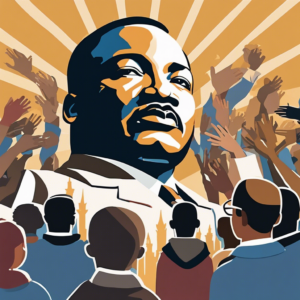
Many people know that Martin Luther King Jr. Day is a federal holiday in the United States, but what they may not know is the true significance behind this day of remembrance.
MLK Day is not just a day off work or school; it is a time to reflect on the immense contributions and impact of Dr. King in the fight for civil rights.
From his leadership during the Civil Rights Movement to his instrumental role in the passage of key legislation, MLK Day serves as a reminder of the progress that has been made and the work that still lies ahead.
By honoring Dr. King’s legacy, this day encourages individuals to continue striving for equality and justice for all.
Historical Context
The historical context surrounding MLK Day is crucial for understanding the significance of this important holiday.
Martin Luther King Jr. was a prominent leader in the Civil Rights Movement during the 1950s and 1960s. He fought tirelessly for racial equality, justice, and nonviolent protest.
MLK Day, celebrated on the third Monday of January each year, honors his legacy and the ongoing struggle for civil rights. It serves as a reminder of the progress that has been made and the work that still needs to be done.
The historical context of MLK Day reminds us of the sacrifices made by King and countless others who fought for equality, and it inspires us to continue working towards a more inclusive and just society.
Civil Rights Movement
Led by Martin Luther King Jr., the Civil Rights Movement fought tirelessly for racial equality, justice, and nonviolent protest. It was a pivotal moment in American history, where African Americans and their allies came together to challenge the systemic racism and discrimination that plagued the nation.
The movement sought to dismantle segregation and secure voting rights for all citizens, regardless of their race. Through peaceful demonstrations, sit-ins, and marches, they brought attention to the injustices faced by African Americans and demanded change. Their efforts were met with resistance and violence, but their determination and courage prevailed.
The Civil Rights Movement paved the way for significant legislative achievements, such as the Civil Rights Act of 1964 and the Voting Rights Act of 1965. It remains a symbol of hope, unity, and the power of collective action in the pursuit of equality for all.
Impact on Legislation
Building on the momentum of the Civil Rights Movement, the impact on legislation was profound as it paved the way for significant strides towards racial equality and justice in America.
Through the tireless efforts of Dr. Martin Luther King Jr. and other civil rights activists, landmark legislation was passed to dismantle segregation and protect the rights of African Americans.
The Civil Rights Act of 1964 prohibited racial discrimination in public places and employment, while the Voting Rights Act of 1965 aimed to remove barriers to voting for African Americans.
These laws marked a turning point in American history, challenging systemic racism and empowering marginalized communities.
MLK Day serves as a reminder of the progress made and the ongoing work needed to achieve true equality for all.
Cultural Significance
With its celebration of Dr. Martin Luther King Jr.’s legacy, MLK Day holds immense cultural significance in recognizing the enduring impact of his activism and inspiring generations to continue the fight for equality.
MLK Day serves as a reminder of the progress made towards racial justice and the work that still needs to be done. It’s a day when people come together to honor Dr. King’s teachings of love, peace, and nonviolence.
MLK Day isn’t just a day off from work or school; it’s a day for reflection, education, and action. It allows individuals to engage in conversations about race, discrimination, and social justice, fostering a sense of belonging and unity.
Continuing the Legacy
Continuing Dr. Martin Luther King Jr.’s legacy, we must actively work towards dismantling systemic racism and promoting equality for all.
Today, we find ourselves in a society still burdened by racial injustice and inequality. It’s our collective responsibility to carry on the work that Dr. King started, to challenge and dismantle the systems that perpetuate discrimination and prejudice.
We must actively engage in conversations about race, educate ourselves about the experiences of marginalized communities, and advocate for change. By acknowledging and addressing our own biases, we can contribute to a more inclusive and equitable society.
Together, we can create a future where everyone feels a sense of belonging, where the color of one’s skin doesn’t determine their opportunities or treatment.
It’s up to us to continue Dr. King’s legacy and strive for a truly just and equal world.
Frequently Asked Questions
What Were Some Key Events in the Life of Martin Luther King Jr. That Led to the Establishment of MLK Day?
Martin Luther King Jr.’s key events, like the Montgomery bus boycott and the March on Washington, inspired and mobilized countless individuals in the fight for civil rights, ultimately leading to the establishment of MLK Day.
How Did the Civil Rights Movement Impact Other Marginalized Communities Beyond African Americans?
The civil rights movement impacted other marginalized communities beyond African Americans by inspiring them to fight for their own rights and equality. It created a sense of solidarity and empowerment among diverse groups seeking justice and social change.
Did MLK Day Have Any Immediate Effect on Legislation Regarding Racial Equality?
MLK Day did not have an immediate effect on legislation regarding racial equality. However, it played a crucial role in raising awareness, promoting dialogue, and fostering a sense of unity among people striving for justice and equality.
How Has MLK Day Influenced the Cultural Landscape of the United States?
MLK Day has had a profound impact on the cultural landscape of the United States. It serves as a powerful reminder of Dr. King’s legacy, inspiring individuals to continue the fight for equality and justice.
What Are Some Current Initiatives or Movements That Are Carrying on Mlk’s Legacy of Fighting for Racial Equality?
There are several current initiatives and movements that continue MLK’s legacy of fighting for racial equality, including Black Lives Matter, Campaign Zero, and the NAACP’s #WeAreDoneDying campaign. These movements work towards creating a more just and equitable society.
Conclusion
In conclusion, MLK Day holds immense significance in our nation’s history. It not only commemorates the pivotal role Dr. Martin Luther King Jr. played in the Civil Rights Movement but also highlights the progress made in advancing equal rights and social justice.
This day serves as a reminder of the ongoing work needed to fulfill Dr. King’s dream of a truly inclusive and equitable society. Let’s continue to honor his legacy by actively promoting unity, understanding, and equality for all.










